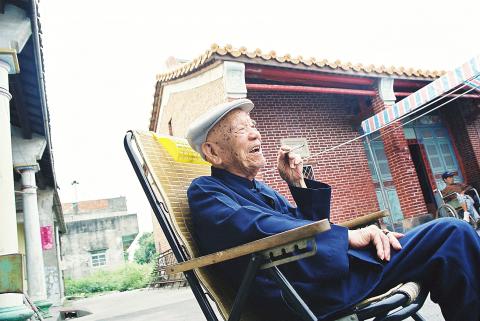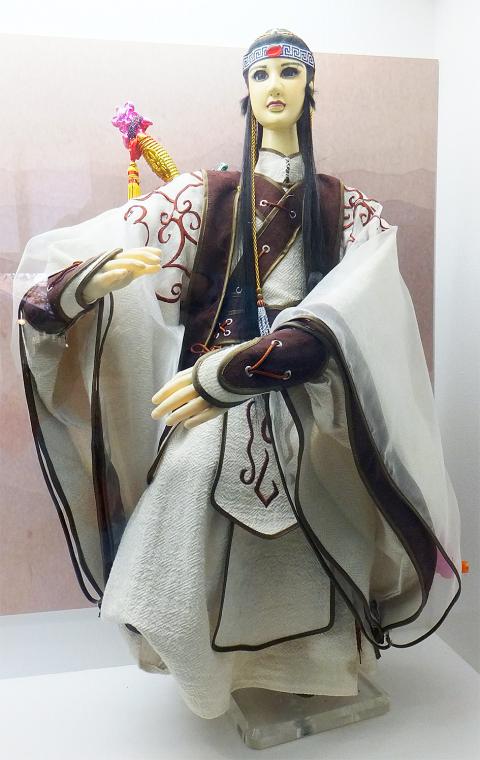Taiwan in Time: Dec. 28 to Jan. 3
The moment the Japanese police left the scene to drink elsewhere, Huang Hai-dai (黃海岱) knew it was his time to shine.
The legendary puppet master dropped the kimonos and Japanese soundtracks, brought out the hidden traditional gongs and drums while the audience waited in anticipation for what they really came to watch.

Photo courtesy of Pili International Multimedia
With people keeping an eye on the theater entrance in case the police came back, the performance continued late into the night. If caught, Huang’s troupe would be accused of staging a private show and might even be beaten and having its license suspended.
It was the late 1930s and Japanese invasion of China was in full swing. The new imperialist policy in Taiwan was to “Japanize” the population and eradicate local culture, including the puppet shows.
Because the shows were such an integral part of local culture — especially those staged during various holidays to celebrate the gods — the Japanese decided to keep a few troupes around to avoid public fury.

Courtesy of Wikimedia Commons
Huang’s Wuzhouyuan (五洲園) was one of them, but they could only stage government-approved productions with the puppets wearing Japanese garb performing to Japanese or Western tunes. The actors were allowed to speak Hoklo (commonly known as Taiwanese), but it had to be peppered with Japanese phrases. All traditional instruments were banned.
Huang only complied when the Japanese were around. Born on Jan. 2, 1901 in today’s Yunlin County, he was a proud student of Han-Chinese culture. His father, also a puppeteer, didn’t have money to send him to Japanese school, so he would travel every day to learn from a Taiwanese teacher. There, he read literary classics and became familiar with the heroic and historic novels that would later become the basis of his work.
Huang took over his father’s troupe at the age of 24 and renamed it Wuzhouyuan, with zhou referring to an administrative district during the Japanese era.
His ambition was clear here — his goal was to be known throughout all five zhou in Taiwan. His group started out with shows depicting the solving of famous legal cases, and later started putting on adaptations of martial arts novels, which were much more fast-paced and entertaining than the audience was used to. He also stood out because he was able to write his own scripts.
Life was frequently on the road, with an annual trip to Tainan during Ghost Month to perform daily shows to appease the gods for two months straight. He also had precise control of his nasal cavity, lips, teeth, tongue, throat and dantian (丹田, energy center) in order to accurately personify characters of any gender, disposition and age — to the point that he said even a blind person could enjoy the show.
His son, Huang Feng-shih (黃逢時) says in a biography that his father believed that puppetry could inspire people and bring culture to the masses, thus his shows always had elements of “good against evil, loyal against cunning as well as the chivalrous spirit and tender heart (of martial arts heroes).”
Huang’s troupe enjoyed huge popularity after the Japanese defeat, but he slowly retreated behind the scenes, leaving the big stage to his sons and many disciples.
His most famous creation is perhaps Shih Yan-yun (史炎雲), who appeared in his show Anthology of the Loyal, Brave, Filial and Righteous (忠勇孝義傳), adapted from a Qing Dynasty book that was banned during the Japanese era.
Another son, Huang Chun-hsiung (黃俊雄) revised the story into The Scholarly Swordsman of Yunzhou (雲州大儒俠) and renamed the character Shi Yan-wen (史艷文), who is almost synonymous with Taiwanese puppet theater even today.
The younger Huang brought puppetry to new heights by turning the performances into a television show. Debuting in March 1970, it set a record television rating of 97 percent as students reportedly skipped class while farmers left their fields to watch the swordsman lead a band of heroes against evil forces.
The government banned the show a few years later under the grounds of “disrupting the nation’s labor schedule,” but Huang recalls later that the real reason was that it used Hoklo, which conflicted with the Mandarin-centric government policy.
The show resumed in 1987 and continued on national television until 2003. Huang Hai-dai died in 2007, but his legacy continues in his many grandchildren who strive to keep traditional puppetry alive.
Taiwan in Time, a column about Taiwan’s history that is published every Sunday, spotlights important or interesting events around the nation that have anniversaries this week.

The People’s Republic of China (PRC) invaded Vietnam in 1979, following a year of increasingly tense relations between the two states. Beijing viewed Vietnam’s close relations with Soviet Russia as a threat. One of the pretexts it used was the alleged mistreatment of the ethnic Chinese in Vietnam. Tension between the ethnic Chinese and governments in Vietnam had been ongoing for decades. The French used to play off the Vietnamese against the Chinese as a divide-and-rule strategy. The Saigon government in 1956 compelled all Vietnam-born Chinese to adopt Vietnamese citizenship. It also banned them from 11 trades they had previously

Jan. 12 to Jan. 18 At the start of an Indigenous heritage tour of Beitou District (北投) in Taipei, I was handed a sheet of paper titled Ritual Song for the Various Peoples of Tamsui (淡水各社祭祀歌). The lyrics were in Chinese with no literal meaning, accompanied by romanized pronunciation that sounded closer to Hoklo (commonly known as Taiwanese) than any Indigenous language. The translation explained that the song offered food and drink to one’s ancestors and wished for a bountiful harvest and deer hunting season. The program moved through sites related to the Ketagalan, a collective term for the

Growing up in a rural, religious community in western Canada, Kyle McCarthy loved hockey, but once he came out at 19, he quit, convinced being openly gay and an active player was untenable. So the 32-year-old says he is “very surprised” by the runaway success of Heated Rivalry, a Canadian-made series about the romance between two closeted gay players in a sport that has historically made gay men feel unwelcome. Ben Baby, the 43-year-old commissioner of the Toronto Gay Hockey Association (TGHA), calls the success of the show — which has catapulted its young lead actors to stardom -- “shocking,” and says

As devices from toys to cars get smarter, gadget makers are grappling with a shortage of memory needed for them to work. Dwindling supplies and soaring costs of Dynamic Random Access Memory (DRAM) that provides space for computers, smartphones and game consoles to run applications or multitask was a hot topic behind the scenes at the annual gadget extravaganza in Las Vegas. Once cheap and plentiful, DRAM — along with memory chips to simply store data — are in short supply because of the demand spikes from AI in everything from data centers to wearable devices. Samsung Electronics last week put out word